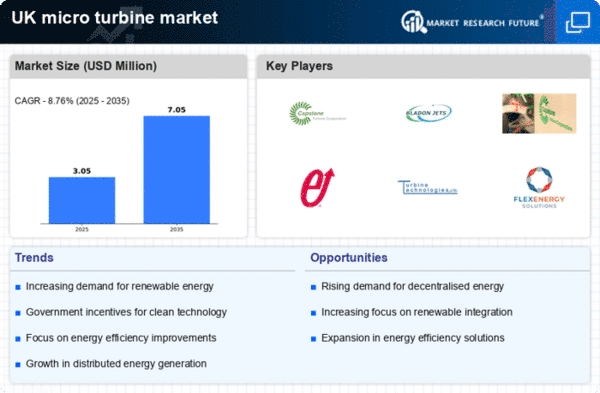Rising Energy Costs
The micro turbine market is also being driven by the rising costs of traditional energy sources. As energy prices continue to escalate, both consumers and businesses are seeking alternative solutions to mitigate their energy expenses. Micro turbines offer a cost-effective means of generating electricity, particularly in remote or off-grid locations. The UK has witnessed a steady increase in energy prices, prompting a shift towards more sustainable and economically viable energy solutions. The micro turbine market is likely to capitalize on this trend, as it provides a practical alternative that can help users manage their energy costs effectively.
Decentralized Energy Generation
The micro turbine market is increasingly influenced by the trend towards decentralized energy generation. This approach allows for energy production closer to the point of consumption, reducing transmission losses and enhancing energy security. In the UK, local authorities and businesses are investing in micro turbine technology to create energy independence and resilience. The market is expected to see a significant uptick as more entities recognize the benefits of generating their own power. With the potential to reduce energy costs by up to 30%, the micro turbine market is poised to attract investments and innovations that cater to this growing demand for localized energy solutions.
Government Incentives and Funding
The micro turbine market in the UK is benefiting from various government incentives and funding programs aimed at promoting renewable energy technologies. Initiatives such as grants, subsidies, and tax incentives are encouraging the adoption of micro turbines among businesses and homeowners. The UK government has allocated substantial resources to support the transition to low-carbon technologies, which is likely to stimulate growth in the micro turbine market. As financial barriers are reduced, more stakeholders are expected to invest in micro turbine solutions, further driving market expansion.
Growing Interest in Renewable Energy
The micro turbine market in the UK is experiencing a notable surge in interest due to the increasing emphasis on renewable energy sources. The UK government has set ambitious targets to achieve net-zero carbon emissions by 2050, which has led to a heightened focus on sustainable energy solutions. Micro turbines, which can efficiently convert various fuels into electricity, are seen as a viable option for both residential and commercial applications. The market is projected to grow at a CAGR of approximately 8% over the next five years, driven by this shift towards greener energy. As consumers and businesses alike seek to reduce their carbon footprints, the micro turbine market is likely to benefit from this growing trend, positioning itself as a key player in the renewable energy landscape.
Technological Innovations in Micro Turbines
Technological advancements in micro turbine design and efficiency are playing a crucial role in shaping the market landscape. Innovations such as improved materials, enhanced combustion processes, and advanced control systems are making micro turbines more efficient and reliable. The UK is home to several research initiatives aimed at optimizing micro turbine performance, which could lead to increased adoption across various sectors. As these technologies evolve, the micro turbine market is expected to expand, offering more competitive solutions that meet the diverse needs of consumers and businesses alike.
















